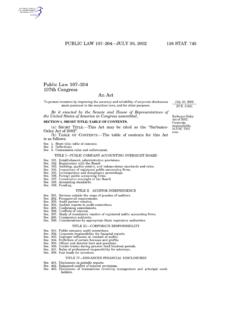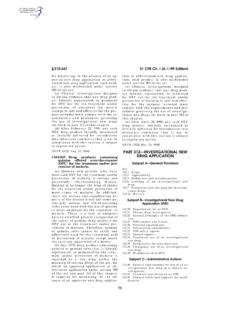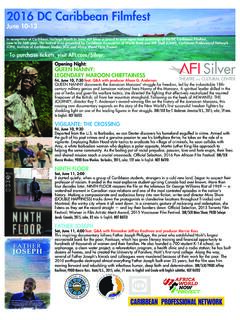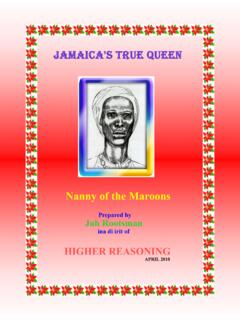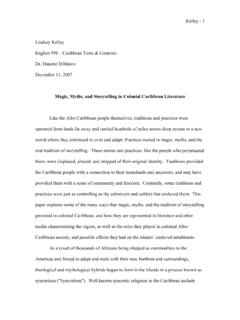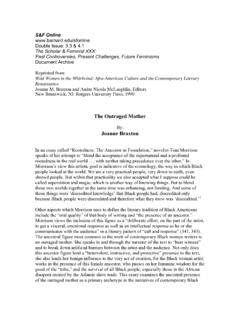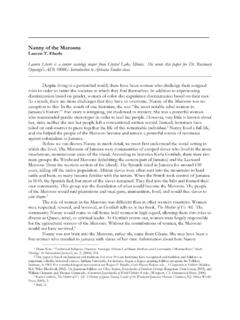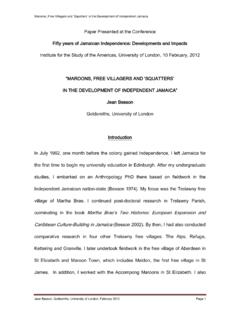Transcription of July 22, 2004 CONGRESSIONAL RECORD Extensions of …
1 CONGRESSIONAL RECORD Extensions of RemarksE1465 july 22, 2004 contributing to society. Sal and Myra consider their children their major accomplishments. As busy as Sal and Myra were, they still took the time to find a way to involve the en-tire family in a tobacco farming business for a number of years when the children were teen-agers, even venturing into an experimental curing process which was monitored by the University of Maryland. The Raspas also oper-ated an air conditioning and refrigeration busi-ness at one time.
2 The Raspas have constantly demonstrated their commitment to service through their par-ticipation in other civic activities in St. Mary s County. Sal served four terms on the Demo-cratic Central Committee and served as chair for two terms. He belongs to the Lexington Park Lions Club and received the Melvin Jones Award in 2002, which is the highest award given by Lions Club International. He was elected to the St. Mary s County Board of Education in 2002 and currently holds the po-sition of Vice Chairman.
3 Myra has been active on many county and state committees including the State Depart-ment of Education Standards Setting Com-mittee for English; the Maryland Assessment Consortium; the Gifted and Talented Task Force; Integrated Support Team; PreK 12 Intervention Task Force; Project SMART Grant Advisory Committee; MSPAP MEGA TASK Developer; Content Coordinator for English/ Language Arts/Writing MEGA TASK, Mary-land State Department of Education; and TASK-WRITER for High School Assessments, Maryland State Department.
4 Both Sal and Myra Raspa are still very ac-tive in St. Mary s County and continue to ad-vocate for children. They believe in contrib-uting for the betterment of the community. Mr. Speaker, on this day I wish Dr. and Mrs. Raspa well in their future pursuits. f HONORING THE COUNTRIES OF THE CARIBBEAN ON THE OCCA-SION OF THE 166TH ANNIVER-SARY OF THEIR EMANCIPATION FROM SLAVERY HON. CHARLES B. RANGEL OF NEW YORK IN THE HOUSE OF REPRESENTATIVES Thursday, july 22, 2004 Mr.
5 RANGEL. Mr. Speaker, I rise today in one accord with all the former British colonies in the Caribbean to celebrate the 166th anni-versary of Emancipation Day, August 1, 1838. In doing so, I wish to not simply recount the histories of the islands in the Caribbean, for I could hardly do justice to their diverse and compelling paths to freedom. Instead, I would like to commemorate the great day of Emanci-pation with a narrative of cunning, resolve, and triumph, a story that in many ways sym-bolizes the history of all the former British colonies which were granted freedom on that great August day.
6 Early in the 18th century the British brought a young lady to Jamaica s shores to work as a slave. Like the Caribbean countries them-selves, her roots were African. Her name was likely a strong Ashanti one since she hailed from that great African kingdom, but upon ar-riving she was stripped of her given nomen-clature and was known to her fellow slaves simply as nanny . Slavery persisted in the Caribbean until 1834 and then in the name of apprentice-ship until 1838, but it did not persist with Granny nanny of the Maroons , as she is known today.
7 Soon after her arrival she dis-played the world-renown Caribbean penchant for cutting her own path, and escaped from her master s plantation with her five brothers. Granny nanny then traveled around the coun-tryside organizing free Africans in the towns of St. James, St. Elizabeth, and Portland. She eventually established nanny Town and based the community s governance on the Ashanti society. Like the Caribbean countries, nanny was small and wiry, but also like these countries, she was singularly focused in her pursuit of self-determination.
8 The vast British military presence on the island launched numerous at-tacks on nanny and her comrades, hoping to force them back into slavery, but for nearly two decades nanny , the acknowledged and greatly respected leader of an army of at least 800 maroons, withstood their aggressions. She placed guards at look-out points, sent spies to live among the slaves in British plan-tations, and ordered her fighters to dress like trees and bushes, so that when the British en-tered these human forests they would be overwhelmed by nanny s forces.
9 In 1737 the British offered nanny a truce: the maroons would be given land and rights as free men, but only if they promised to help capture and return runaway slaves, assist the Government in putting down revolts, and cease their wars with the British. Their only other alternative would be to continue in their campaign against the massive British military, pitting 800 men against what was, at that time, the strongest army in the world. nanny refused their offer.
10 And still, these Caribbean countries refuse. Thus, I feel that the story of Granny nanny is in many ways the story of Barbados, Nevis, Bahamas, Antigua, Barbuda, Montserrat, Ja-maica, Trinidad and Tobago, Saint Vincent, Grenada, and Saint Lucia. For centuries, the people of these countries refused to accept British colonialism, stub-bornly resisting the British from hideaways in cities, mountains, and forests. In 1838 they were finally freed from slavery s grasp, but they have not become complacent.




